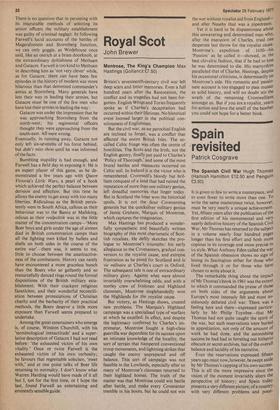Royal Scot
John Brewer
Montrose, The King's Champion Max Hastings (Gollanoz £7.50)
Britain's seventeenth-century civil war left deep scars and bitter memories. Even a full hundred years after the Restoration, the conflict and its tragedies had not been forgotten. English Whigs and Tories frequently spoke as if Charles's decapitation had occurred within their lifetimes. No historical event loomed larger in the political consciousness of Englishmen.
But the civil war, as we parochial English are inclined to forget, was a conflict that affected the entire British Isles. The socalled Celtic fringe was often the centre of hostilities. The Scots and the Irish, not the English gentry, finally put paid to Charles's 'Policy of Thorough,' and some of the most brutal battles and massacres occurred on Celtic soil. In Ireland it is the victor who is remembered. Cromwell's bloody but brilliant conquest of a land that had ruined the reputation of more than one military genius, left dreadful memories that linger today. But in Scotland the loser won the historical spoils. It is not the dour Covenanting generals but the quicksilver military genius of Jamie Graham, Marquis of Montrose, which captures the imagination.
Max Hastings has produced a wonderfully sympathetic and beautifully written biography of this most charismatic of Scottish royalists. He deftly sketches the prologue to Montrose's triumphs: his early allegiance to the Covenanters, gradual conversion to the royalist cause, and extreme frustration as he pined for Scotland and la vie militaire at Charles's court in Oxford. The subsequent tale is one of extraordinary military glory. Against what were almost invariably overwhelming odds, and with a motley crew of Irishmen and Highland clansmen, Montrose singlehandedly won the Highlands for the royalist cause,
But victory, as Hastings shows, created new problems. The Marquis's Highland campaign was a specialised type of warfare at which he excelled. In effect, and despite the legitimacy conferred by Charles's imprimatur, Montrose fought a high-class guerrilla war dependent for its success upon an intimate knowledge of the locality, the sort of terrain that hampered conventional troop movements, and lightning strikes that caught the enemy unprepared and off balance. This sort of campaign was not feasible in the Lowlands, especially after so many of Montrose's clansmen returned to their highland homes. The truth of the matter was that Montrose could win battle after battle, and make every Covenanter tremble in his boots, but he could not win
the war without royalist aid from England— and after Naseby that was a pipedream.
Yet it is hard to be dispassionate about this unwavering and determined man who, after the execution of Charles, tried one desperate last throw for the royalist cause. Montrose's expedition of 1650—his 'Passion' as he called it—showed, in the best chivalric fashion, that if he had to lose he was determined to die. His martyrdom paralleled that of Charles. Hastings, despite his occasional criticisms, is determinedly on Montrose's side. His romantic and passionate account is too engaged to pass muster as solid history, and will no doubt stir the wrath of the remaining Cromwellians amongst us. But if you are a royalist, yearn for action and love the smell of the heather you could not hope for a better book.


































 Previous page
Previous page